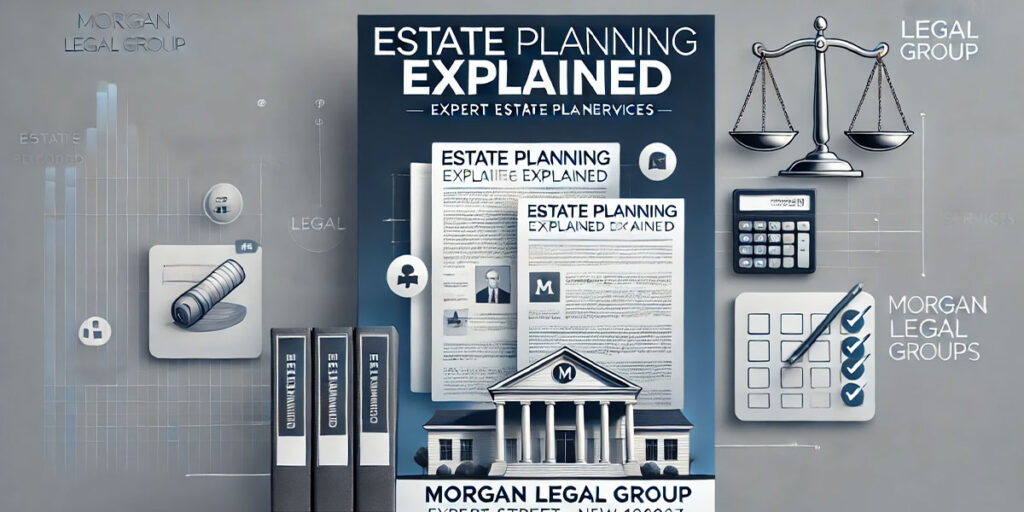New York Estate Planning: A Comprehensive Guide for 2025
Estate planning, a vital aspect of responsible adulthood, involves preparing for the management and distribution of your assets in the event of your incapacity or death. In New York State, the process requires careful consideration of state-specific laws and regulations. At Morgan Legal Group, we provide expert guidance to navigate these complexities. This comprehensive guide aims to explain estate planning in New York, helping you understand the essential elements and how to secure your future and protect your loved ones.
Why is Estate Planning Important in New York?
Estate planning is not just for the wealthy. It’s a crucial process for anyone who wants to ensure their wishes are carried out, protect their family, and minimize potential legal and financial burdens. In New York, without a proper estate plan, your assets will be distributed according to state intestacy laws, which may not align with your personal desires. Furthermore, an effective estate plan can significantly reduce estate taxes and simplify the probate process for your heirs. For this reason, creating an estate plan is important for most adults and families to avoid headaches and strife after a death occurs.
Therefore, taking the time to create a solid plan can provide peace of mind and financial security for you and your loved ones. Morgan Legal Group specializes in creating personalized estate plans that reflect your unique circumstances and goals. Our experienced attorneys are here to guide you every step of the way.
Key Components of a New York Estate Plan
A comprehensive estate plan typically includes several key documents, each serving a specific purpose. These documents, when properly executed, work together to ensure your wishes are respected and your assets are distributed according to your plan.
1. Wills
A will is a legal document that outlines how you want your assets to be distributed after your death. It allows you to name beneficiaries, designate guardians for minor children, and appoint an executor to manage your estate. Without a will, your assets will be distributed according to New York’s intestacy laws. Furthermore, you will have no say in who manages your estate or cares for your children. Thus, even a simple will is better than nothing at all.
In New York, to be valid, a will must meet certain requirements, including being signed by you in the presence of two witnesses, who must also sign the will. Our attorneys at Morgan Legal Group can help you draft a will that complies with all legal requirements and accurately reflects your wishes.
2. Trusts
A trust is a legal arrangement where you (the grantor) transfer assets to a trustee, who manages them for the benefit of designated beneficiaries. Trusts can be used for various purposes, including avoiding probate, minimizing estate taxes, and providing for loved ones with special needs. In addition, they allow you to dictate not only the distribution of your assets but the schedule upon which your assets are distributed.
There are several types of trusts available in New York, each with its own advantages and disadvantages. These include:
- Revocable Living Trusts: Allow you to maintain control of your assets during your lifetime and can be changed or revoked. After your death, the assets in the trust pass directly to your beneficiaries, avoiding probate.
- Irrevocable Trusts: Cannot be easily modified or terminated once established. These trusts can provide significant tax benefits and asset protection. Furthermore, by giving up control, you shield your assets from certain risks.
- Special Needs Trusts: Designed to provide for individuals with disabilities without jeopardizing their eligibility for government benefits.
- Testamentary Trusts: Created through your will and become effective upon your death.
Choosing the right type of trust depends on your specific goals and circumstances. For instance, a revocable trust gives you flexibility, while an irrevocable trust offers more robust asset protection. Morgan Legal Group can help you determine the best trust strategy for your needs.
3. Power of Attorney
A power of attorney is a legal document that authorizes someone you trust (your agent) to make financial decisions on your behalf if you become incapacitated. In New York, there are different types of power of attorney, including:
- Durable Power of Attorney: Remains in effect even if you become incapacitated.
- Springing Power of Attorney: Becomes effective only upon the occurrence of a specific event, such as your incapacitation.
Granting a power of attorney can prevent the need for a court-appointed guardianship, which can be a lengthy and expensive process. For example, if you are suddenly hospitalized and unable to pay your bills, your agent can step in and manage your finances. A power of attorney allows you to select that agent in advance.
4. Health Care Proxy
A health care proxy allows you to appoint someone to make medical decisions on your behalf if you are unable to do so. This document ensures your healthcare wishes are respected and can prevent disagreements among family members. In New York, your health care proxy has the legal authority to make medical decisions for you, in accordance with your wishes and best interests.
5. Living Will
A living will, also known as an advance directive, outlines your wishes regarding medical treatment in the event you are unable to communicate them yourself. It typically addresses end-of-life decisions, such as whether you want to receive life-sustaining treatment. For example, it allows you to express your preference regarding ventilation, artificial nutrition, or pain management. The document ensures that your desires are known and respected.
These documents can be crucial in ensuring your wishes are respected and that family members do not have to grapple with difficult decisions during a time of grief and stress. To ensure that these documents accurately reflect your desires and meet legal requirements, you should seek counsel from Morgan Legal Group.
Understanding New York Intestacy Laws
If you die without a will in New York, your assets will be distributed according to the state’s intestacy laws. These laws dictate how your property is divided among your surviving spouse, children, and other relatives. The specific distribution depends on your family situation.
Intestate Succession Rules
- If you have a spouse but no children: Your spouse inherits everything.
- If you have a spouse and children: Your spouse inherits the first $50,000 and one-half of the remaining property, while your children inherit the rest.
- If you have children but no spouse: Your children inherit everything.
- If you have no spouse or children: Your assets will be distributed to other relatives, such as parents, siblings, or grandparents, according to a specific order of priority outlined in the law.
Intestacy can lead to unintended consequences and family disputes. Your assets may not be distributed in the way you would have preferred. Furthermore, the probate process can become more complex and time-consuming. Therefore, creating a will is essential to ensure your wishes are honored.
The Probate Process in New York
Probate is the legal process of administering a deceased person’s estate. It involves validating the will (if one exists), identifying and valuing assets, paying debts and taxes, and distributing the remaining assets to the beneficiaries. The probate process in New York can be lengthy and complex, often requiring court appearances and legal filings. It can also be expensive, involving executor fees, attorney fees, and court costs.
Steps in the Probate Process
- Filing the Will: The executor named in the will must file it with the Surrogate’s Court in the county where the deceased person resided.
- Petition for Probate: The executor must file a petition requesting that the court formally recognize the will and appoint them as the executor.
- Notice to Heirs: All heirs and beneficiaries must be notified of the probate proceeding.
- Inventory of Assets: The executor must create an inventory of all estate assets and their values.
- Payment of Debts and Taxes: The executor must pay all outstanding debts and taxes owed by the deceased.
- Distribution of Assets: Once all debts and taxes are paid, the executor can distribute the remaining assets to the beneficiaries according to the will.
- Accounting: the executor has a duty to keep beneficiaries informed of the estate’s affairs and can be compelled to account to the court.
Trusts are often used to avoid probate, as assets held in a trust pass directly to the beneficiaries without court intervention. This can save time, money, and stress for your loved ones. Therefore, many estate plans include one or more trusts for this reason alone.
Estate Taxes in New York
New York imposes an estate tax on estates exceeding a certain threshold. As of 2025, the New York estate tax threshold is \$6.94 million. If your estate is worth more than this amount, it may be subject to estate tax, which can significantly reduce the amount your beneficiaries receive. The estate tax rate in New York ranges from 3.06% to 16%, depending on the size of the estate.
Strategies to Minimize Estate Taxes
- Gifting: Making gifts during your lifetime can reduce the size of your taxable estate. In 2025, you can gift up to \$18,000 per person per year without incurring gift tax.
- Trusts: Certain types of trusts, such as irrevocable life insurance trusts (ILITs) and qualified personal residence trusts (QPRTs), can help minimize estate taxes.
- Charitable Donations: Donating to qualified charities can reduce your taxable estate.
Careful planning is essential to minimize estate taxes and preserve as much of your wealth as possible for your heirs. Morgan Legal Group can help you develop strategies to reduce or eliminate estate taxes.
Guardianship in New York
Guardianship is a legal process where a court appoints someone to make decisions for an individual who is unable to do so themselves. This can be necessary for minor children whose parents have died or become incapacitated, as well as for adults who have lost the capacity to manage their own affairs due to illness or injury. In New York, there are two main types of guardianship:
- Guardianship of the Person: Involves making decisions about the individual’s personal care, such as housing, medical treatment, and education.
- Guardianship of the Property: Involves managing the individual’s finances and assets.
Avoiding Guardianship
As mentioned above, proper estate planning can help avoid the need for guardianship. For example, designating a guardian for your minor children in your will ensures that your children will be cared for by someone you trust if something happens to you. In addition, a power of attorney and health care proxy can authorize someone to make financial and medical decisions on your behalf if you become incapacitated, avoiding the need for a court-appointed guardian.
Elder Law in New York
Elder law encompasses a range of legal issues affecting older adults, including estate planning, Medicaid planning, long-term care planning, and guardianship. In New York, elder law attorneys help seniors and their families navigate these complex issues and protect their rights. Morgan Legal Group provides comprehensive elder law services to help you plan for your future and ensure your needs are met.
Medicaid Planning
Medicaid is a government program that provides healthcare coverage to low-income individuals and families. In New York, Medicaid can help pay for long-term care services, such as nursing home care. However, to qualify for Medicaid, you must meet certain income and asset requirements. Medicaid planning involves legally structuring your assets to meet these requirements while preserving as much of your wealth as possible. This can be complex, as there are look-back periods and transfer penalties to consider.
Long-Term Care Planning
Long-term care can be expensive, and many people cannot afford to pay for it out of pocket. Long-term care planning involves making arrangements to pay for your care needs, whether through private insurance, Medicaid, or other sources. It also involves making decisions about where you want to receive care, whether in your home, an assisted living facility, or a nursing home.
Wills vs. Trusts: Which is Right for You?
Wills and trusts are both important estate planning tools, but they serve different purposes. A will is a legal document that directs how your assets should be distributed after your death, while a trust is a legal arrangement where you transfer assets to a trustee who manages them for the benefit of your beneficiaries.
Key Differences
- Probate: Wills must go through probate, while trusts generally avoid probate.
- Control: Trusts offer more control over how and when your assets are distributed.
- Privacy: Trusts offer more privacy than wills, as they are not public records.
- Cost: Wills are generally less expensive to create than trusts, but trusts can save money in the long run by avoiding probate.
The best choice for you depends on your individual circumstances and goals. If you want to avoid probate and maintain more control over your assets, a trust may be the better option. However, if you have a simple estate and are primarily concerned with naming beneficiaries, a will may be sufficient. Thus, seeking advice is the best option.
Common Mistakes to Avoid in Estate Planning
Estate planning can be complex, and it’s easy to make mistakes that can have serious consequences. Here are some common mistakes to avoid:
- Failing to Create an Estate Plan: The biggest mistake is simply not having an estate plan in place.
- Not Keeping Your Estate Plan Up-to-Date: Your estate plan should be reviewed and updated regularly to reflect changes in your life, such as marriage, divorce, birth of children, or changes in assets.
- Not Properly Funding Your Trust: A trust is only effective if you transfer assets into it.
- Not Communicating Your Wishes to Your Family: It’s important to discuss your estate plan with your family so they understand your wishes.
- Using DIY Estate Planning Tools: Online templates and software can be tempting, but they may not be tailored to your specific needs or comply with New York law. The cost of fixing mistakes in these documents is often much higher than hiring a lawyer to draft them correctly in the first place.
Avoiding these mistakes can help ensure your estate plan is effective and your wishes are carried out. Morgan Legal Group can help you create a comprehensive estate plan that avoids common pitfalls.
How to Choose the Right Estate Planning Attorney in New York
Choosing the right estate planning attorney is crucial to ensuring your estate plan is properly drafted and executed. Here are some factors to consider:
- Experience: Choose an attorney who has extensive experience in New York estate planning law.
- Expertise: Make sure the attorney has expertise in the specific areas you need help with, such as trusts, probate, or elder law.
- Reputation: Check the attorney’s reputation and read reviews from past clients.
- Communication: Choose an attorney who communicates clearly and is responsive to your questions.
- Cost: Discuss the attorney’s fees upfront and make sure you understand how they are calculated.
Russell Morgan and the attorneys at Morgan Legal Group have years of experience helping New York families with their estate planning needs. We are committed to providing personalized, high-quality legal services and helping you achieve your goals.
The Importance of Regular Estate Plan Reviews
Estate planning is not a one-time event. Your estate plan should be reviewed and updated regularly to reflect changes in your life, such as marriage, divorce, birth of children, changes in assets, or changes in the law. A good rule of thumb is to review your plan every three to five years or sooner if there is a significant life event.
When to Update Your Estate Plan
- Marriage or Divorce: Marriage or divorce can significantly impact your estate plan, as it affects who your beneficiaries are and how your assets are distributed.
- Birth or Adoption of Children: The birth or adoption of children requires you to update your will to name guardians and provide for their care.
- Change in Assets: A significant increase or decrease in your assets may require you to adjust your estate plan to minimize taxes or ensure your beneficiaries are adequately provided for.
- Change in the Law: Changes in estate tax laws or other relevant laws may require you to update your estate plan to take advantage of new opportunities or avoid potential pitfalls.
- Death of a Beneficiary or Executor: The death of a beneficiary or executor requires you to update your will or trust to name a replacement.
Regular reviews can help ensure your estate plan remains effective and reflects your current wishes. Morgan Legal Group can help you review your estate plan and make any necessary updates.
Taking the Next Steps
Estate planning is a critical process for protecting your family and securing your future. By understanding the key components of an estate plan, avoiding common mistakes, and working with an experienced attorney, you can create a comprehensive plan that meets your unique needs and goals.
Don’t wait to get started. Contact Morgan Legal Group today to schedule a consultation and learn how we can help you create a secure future for yourself and your loved ones.
Disclaimer: *This blog post is for informational purposes only and does not constitute legal advice. You should consult with an attorney to discuss your specific situation.*









